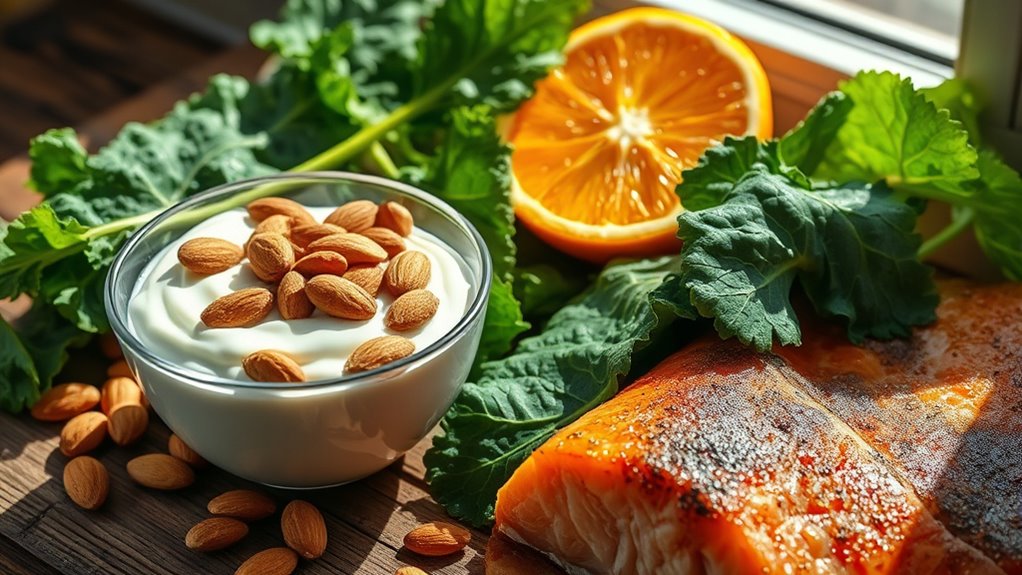To support your bone density after 40, focus on key nutrients like calcium, vitamin D, magnesium, and vitamin K2, which work together to strengthen bones and improve mineralization. Eating a balanced diet with leafy greens, nuts, fish, and fortified foods helps, but supplements may be beneficial if your intake is low. Understanding how these nutrients interact can help you maintain strong bones for years to come—discover more about optimizing your bone health below.
Key Takeaways
- Adequate calcium and vitamin D intake are crucial for maintaining bone density and supporting calcium absorption after 40.
- Vitamin K2 activates osteocalcin, promoting calcium binding and mineralization in bones.
- Magnesium supports bone mineralization and helps prevent osteoporosis, especially important with aging.
- Phosphorus contributes to bone strength through hydroxyapatite crystal formation in collagen.
- A balanced diet rich in zinc, vitamin C, omega-3s, and lifestyle factors like weight-bearing exercise enhance bone health after 40.
The Role of Calcium in Maintaining Bone Strength

Calcium plays a crucial role in keeping your bones strong and healthy, especially as you age. It acts as the primary building block for bone tissue, helping to maintain bone density over time. When you don’t get enough calcium from your diet, your body borrows it from your bones, which can lead to weakening bones and increased fracture risk. Besides supporting bones, calcium is essential for heart rhythm, muscle contraction, and nerve function, making it vital for overall health. Your bones serve as a calcium reservoir, releasing or storing calcium as needed. Ensuring adequate calcium intake through diet helps prevent bone loss and supports strength, especially in later years. Incorporating weight management strategies, such as balanced nutrition and regular physical activity, further supports healthy bones. While calcium alone isn’t a magic fix, it’s a fundamental part of maintaining healthy bones as you age. Understanding bone health is essential for developing effective strategies to preserve bone density over time. Additionally, engaging in weight-bearing exercises can stimulate bone growth and improve strength, emphasizing the importance of a comprehensive approach to bone health management. Recognizing the importance of cybersecurity in health information systems can also help protect sensitive data related to bone health.
Vitamin D: The Key to Calcium Absorption
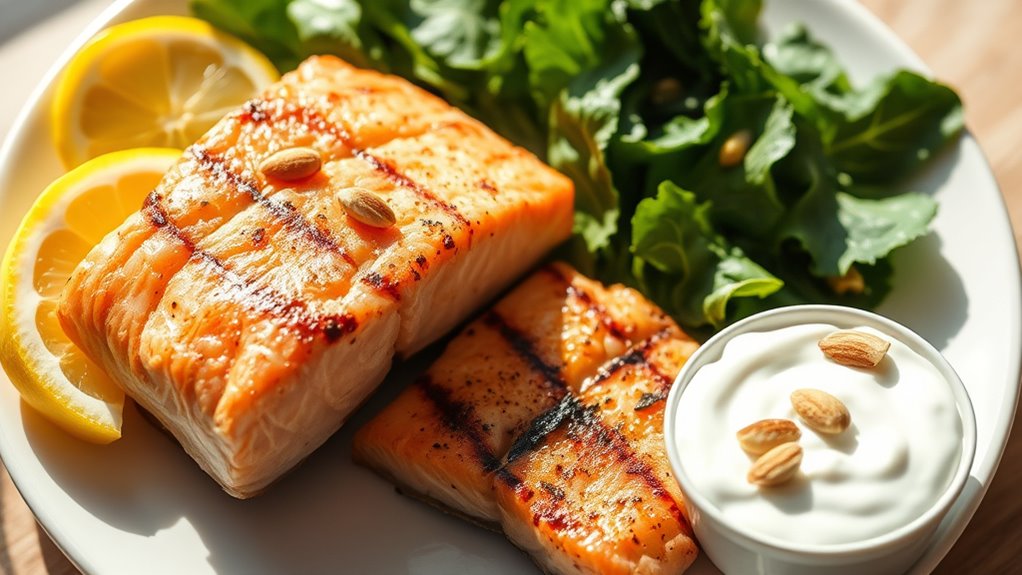
Vitamin D is essential for your body to absorb calcium effectively, which is indispensable for maintaining strong bones as you age. It enhances calcium absorption by stimulating entry into your intestinal cells and promoting transport through the body. The active form, 1,25(OH)2D3, upregulates proteins like TRPV6 and calbindin, increasing absorption efficiency from 10-15% to 30-40%. Without enough vitamin D, your body absorbs less calcium, risking weaker bones and conditions like osteomalacia. Vitamin D works by binding to receptors in your cells, activating genetic programs that boost calcium transporter production. As you age, vitamin D’s effectiveness declines, especially in women, making it critical to maintain ideal levels. sun exposure can naturally boost vitamin D levels, supporting your bone health. Additionally, nutrient absorption can be improved when vitamin D levels are optimal, ensuring your body utilizes calcium efficiently. This process also involves hormonal regulation, which helps maintain calcium balance in your body. Ensuring adequate vitamin D levels is also crucial for immune function, which can influence overall health. Adequate vitamin D ensures your bones stay mineralized and strong, supporting overall skeletal health.
Magnesium’s Contribution to Bone Density
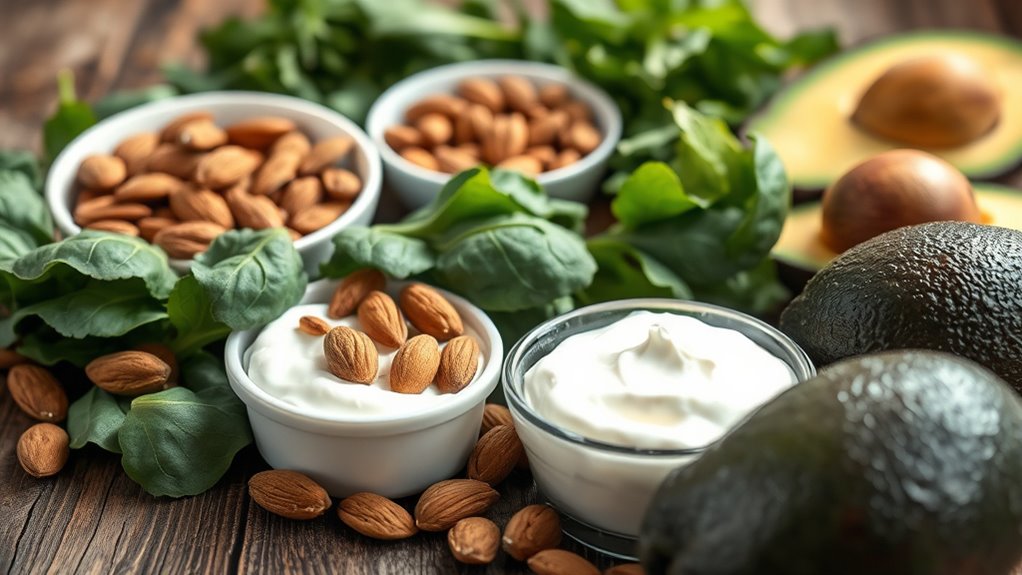
Magnesium plays a crucial role in maintaining your bone strength, supporting processes that prevent loss and osteoporosis. You can get magnesium from dietary sources like nuts, seeds, and leafy greens, or consider supplements if needed. Proper intake helps optimize bone health, especially as you age. Additionally, ensuring a reliable electric bike conversion kit can encourage more active commuting, which benefits overall bone density and health. Engaging in regular weight-bearing exercises can further enhance bone strength and support your skeletal system over time. Understanding the importance of nutrient balance is essential for maintaining healthy bones throughout your life.
Magnesium’s Bone Strength Role
Have you ever wondered how minerals influence your bones’ strength? Magnesium plays an essential role in maintaining bone density and integrity. Higher magnesium intake is linked to increased BMD in critical areas like the hip and femoral neck, supporting overall strength. It also aids in bone mass accrual during growth, especially when supplemented. A deficiency, on the other hand, can decrease BMD and promote osteoporosis by impairing mineralization. Human studies show magnesium can lower bone turnover and boost bone mass in adults. Although evidence on spinal BMD is limited, it remains promising. To maximize magnesium’s benefits, remember that it:
- Supports bone mineralization processes
- Enhances bone cell activity
- Regulates hormones essential for bone health
- Promotes early osteogenic differentiation
- Maintains vascular health within bones
- Vetted supplement sources can ensure adequate intake to support these processes
- Additionally, understanding the electric capabilities of modern bikes can inspire sustainable energy solutions for everyday use.
- A comprehensive approach to nutrient intake can further enhance bone health and overall well-being.
Dietary Sources of Magnesium
To support your bones’ strength, including magnesium-rich foods in your diet is a smart move. Green leafy vegetables like spinach and kale provide substantial magnesium, while legumes such as black beans, chickpeas, and navy beans are excellent sources. Nuts like almonds, cashews, and Brazil nuts offer about 20-30% of your daily value per ounce, with Brazil nuts also providing high selenium. Seeds, especially pumpkin and squash seeds, pack dense magnesium content. Whole grains like quinoa and whole wheat bread are better choices than refined grains. Fruits like avocados contribute magnesium, and fatty fish such as salmon add both magnesium and omega-3s. Incorporating these foods regularly boosts your magnesium intake, supporting healthy bones and overall nutrition. Additionally, nutrient absorption can be optimized by pairing magnesium-rich foods with vitamin D sources, which enhance mineral uptake. Engaging in weight-bearing activities can further strengthen bones and improve overall density. For those interested in Vetted – Mad Tasting, exploring the best espresso machines can enhance your coffee experience. Additionally, maintaining a balanced intake of essential nutrients like magnesium is crucial for long-term bone health.
Supplementing Magnesium Effectiveness
Supplementing magnesium can effectively boost bone density, especially when dietary intake falls short. Research shows magnesium increases BMD in the hip and femoral neck and reduces fracture risk. Magnesium therapy has helped many women improve bone health, with studies confirming its benefits. To maximize effectiveness, consider these points:
- Magnesium supplements are safe and well-tolerated.
- Randomized trials support its positive impact on bone mass.
- Long-term use may sustain bone health benefits.
- Magnesium influences bone metabolism and mineralization.
- It helps regulate hormones crucial for bone strength.
- Additionally, digital literacy programs can empower seniors to use smartphone features, including health apps that track and support bone health.
- As advancements like the Snapdragon 8 Gen 3 enhance mobile device capabilities, health monitoring through smartphones is becoming more accessible and accurate.
- Staying informed about nutrition strategies tailored for bone health can further improve outcomes. Understanding the bioavailability of magnesium is essential for optimizing absorption and efficacy.
The Significance of Vitamin K2 for Bone Health
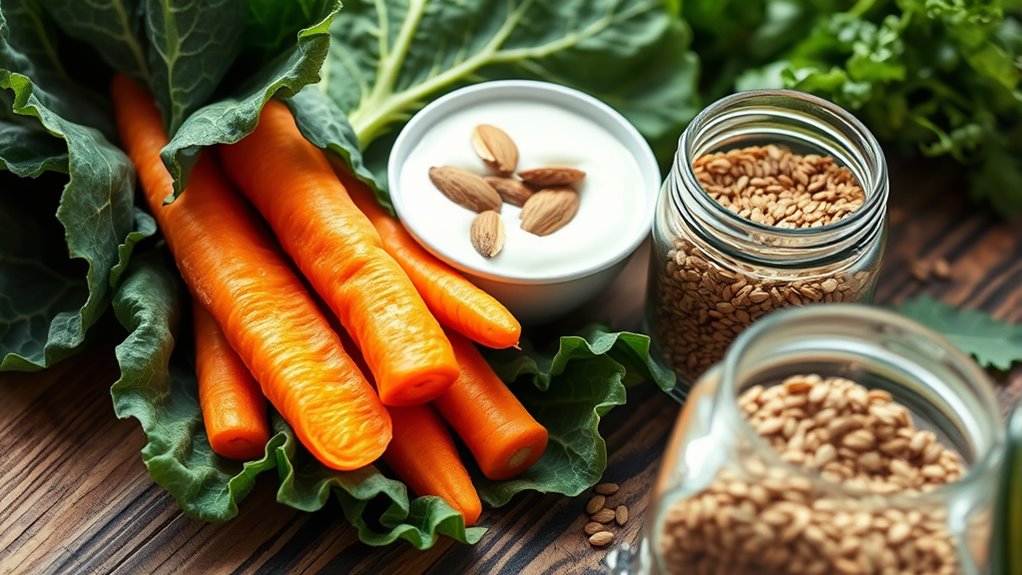
Vitamin K2 plays a vital role in maintaining strong bones by activating osteocalcin, which helps mineralize bone tissue. You can get K2 from foods like aged cheese and fermented vegetables or consider supplements if your diet falls short. Including this nutrient in your routine can greatly support your bone health after 40.
Vitamin K2’s Bone Role
Understanding the role of Vitamin K2 is essential for maintaining strong bones, especially after age 40. It helps regulate bone mineral density by balancing osteoblasts (bone builders) and osteoclasts (bone destroyers). This regulation supports increased bone formation and reduces resorption, lowering fracture risk. Vitamin K2 exists in different forms, like MK-4 and MK-7, each impacting bone health uniquely.
- Promotes bone density by supporting osteoblast activity
- Reduces bone loss, especially in postmenopausal women
- May lower fracture risk through improved bone strength
- Works best when combined with other nutrients, but can be effective alone
- Doses vary; even low levels can benefit bone health
Activation of Osteocalcin
The process by which Vitamin K2 activates osteocalcin is fundamental to its role in maintaining bone strength. Vitamin K2 promotes γ-carboxylation of osteocalcin, transforming it into an active form that binds calcium efficiently. This enhances calcium transport and deposits it into the bone matrix, strengthening bones. The activation is dose-dependent and works synergistically with vitamin D3, boosting osteocalcin production. When osteocalcin is activated, it precipitates with hydroxyapatite, supporting mineralization.
| Vitamin K2 Action | Effect on Bone Health |
|---|---|
| γ-Carboxylation | Converts osteocalcin into its active form |
| Calcium binding | Facilitates calcium incorporation |
| Synergy with D3 | Enhances osteocalcin synthesis |
Sources and Supplementation
Have you considered how the sources of Vitamin K2 impact your bone health? Dietary sources like fermented foods, certain dairy, pork, and poultry provide the most bioavailable forms, especially MK-7. Since intake varies widely by culture and diet, consuming these foods regularly can boost your bone strength. For effective supplementation, doses typically range from 50 to 90 micrograms daily, often as MK-7, which is highly bioavailable. While combining Vitamin K2 with calcium and vitamin D doesn’t necessarily enhance BMD, K2 alone considerably reduces bone loss and fracture risk. Long-term use shows sustained benefits, especially for those with osteoporosis risk factors. Keep in mind:
- Fermented foods are key sources
- MK-7 is the preferred supplement form
- Doses of 50-90 µg daily are effective
- Supplements can work alone or with other nutrients
- Regular intake supports long-term bone health
Essential Phosphorus for Bone Formation
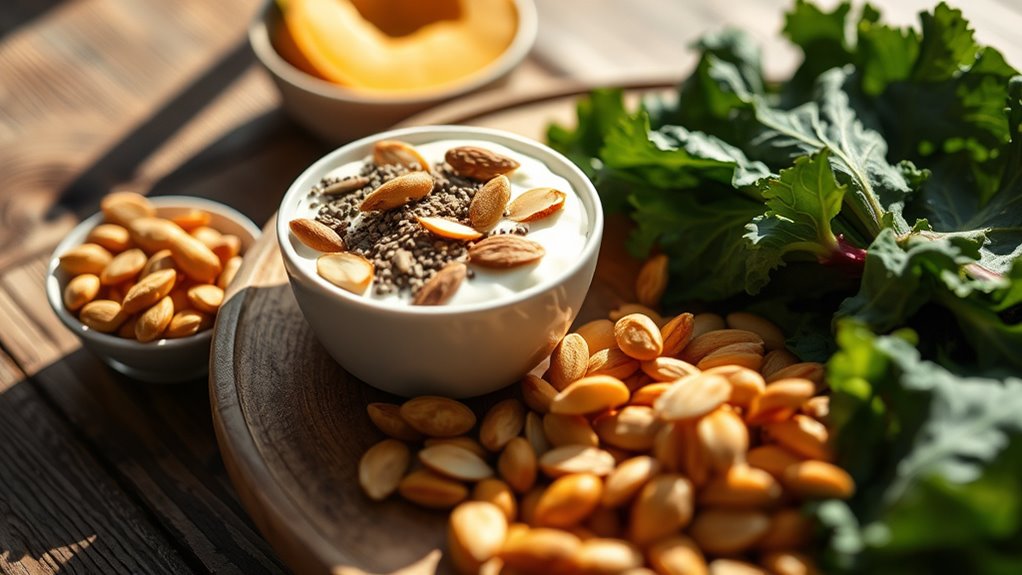
Essential phosphorus plays a critical role in bone formation by contributing to the development of hydroxyapatite crystals, which give bone its strength and rigidity. Phosphorus combines with calcium to form these mineral structures, starting with Posner’s clusters that mineralize into crystalline hydroxyapatite within collagen fibrils. Proper phosphate levels activate osteoblasts, promoting new bone synthesis and mineralization. Enzymes like tissue-non-specific alkaline phosphatase (TNSALP) and PHOSPHO1 help generate phosphate from various sources, ensuring effective mineralization. Maintaining a balance of phosphate is essential; too little weakens bones, increasing fracture risk, while excess can lead to mineralization issues. Your body regulates phosphate through hormones and kidney function, so adequate dietary intake is crucial for supporting healthy bones, especially after 40 when bone density naturally declines.
Supporting Bone Integrity With Vitamin C and Zinc

As you focus on maintaining bone strength after 40, paying attention to nutrients that support bone structure is essential. Vitamin C and zinc play key roles in this process. Vitamin C helps produce collagen, a crucial part of the bone matrix, and acts as an antioxidant to protect bones from damage. Zinc influences bone metabolism by regulating osteoblasts and osteoclasts, supporting bone remodeling and density. To maximize benefits, consider these points:
Supporting bone health after 40 involves vitamin C for collagen and zinc for bone remodeling.
- Consume foods rich in vitamin C like citrus, berries, and greens.
- Include zinc sources such as meat, seafood, and legumes.
- Be aware of the U-shaped relationship; excessive vitamin C can cause oxidative stress.
- Maintain balanced zinc intake to support enzyme activity.
- Use supplements if dietary intake is insufficient, under medical guidance.
Additional Nutrients: Boron, Silicon, and Potassium
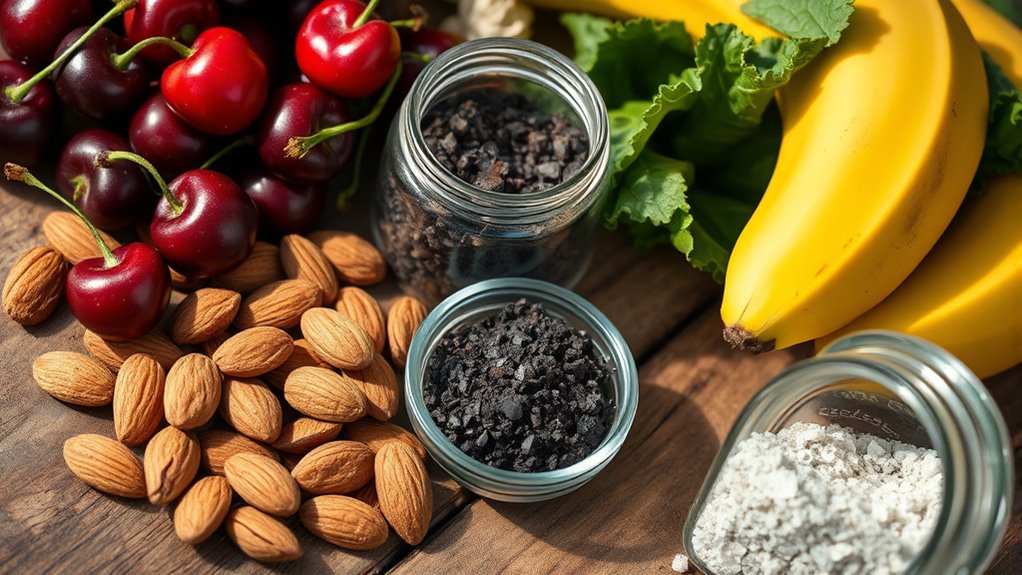
In addition to vitamins and minerals, boron, silicon, and potassium play essential roles in maintaining bone health after 40. Boron supports bone formation by influencing osteoblast and osteoclast activity and extends the half-life of vitamin D and estrogen, both crucial for bone density. It helps preserve bone density by supporting other key nutrients. Silicon boosts bone mineral density by promoting bone formation and reducing resorption, especially in osteoporotic individuals. It also maintains connective tissue health. Potassium reduces blood acidity and decreases calcium loss in urine, helping retain calcium for stronger bones. Consuming foods rich in these nutrients—like nuts, leafy greens, and vegetables—can enhance bone resilience. While research continues, ensuring adequate intake of boron, silicon, and potassium can contribute notably to bone health after 40.
Dietary Sources to Boost Bone Resilience
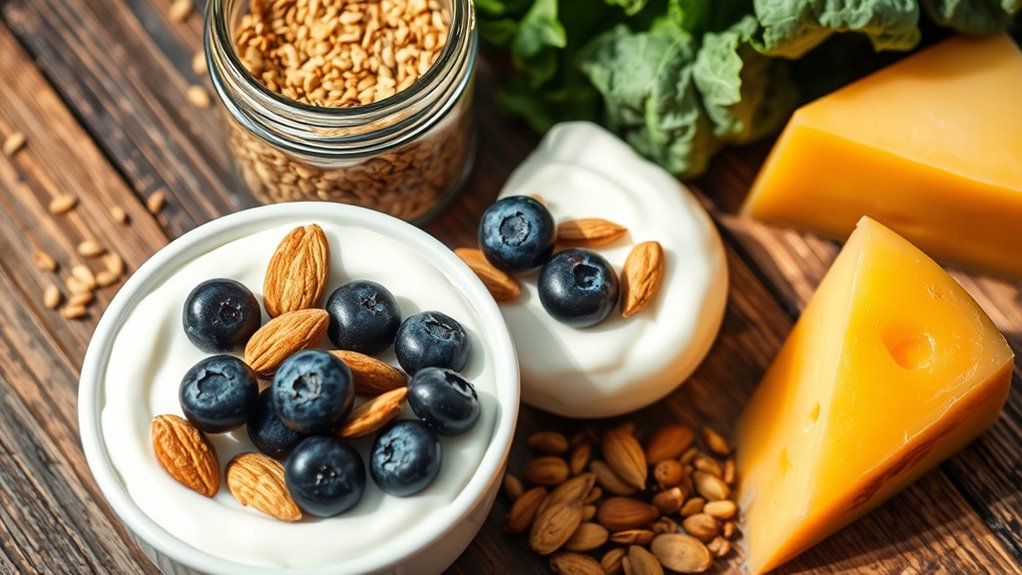
To boost your bone resilience after 40, incorporating key nutrients through your diet is essential. Focus on foods rich in calcium, vitamin D, vitamin K, protein, and vitamin C, which support bone strength and formation. Dairy products like milk, cheese, and yogurt are excellent calcium sources. Leafy greens such as kale and spinach also provide calcium and other minerals. Fatty fish like salmon supply both calcium and vitamin D, aiding absorption and mineralization. Fortified foods, including cereals and plant-based milks, can help meet your needs. Tofu is a versatile plant-based calcium source. Prioritize:
Enhance bone strength after 40 with calcium-rich foods like dairy, greens, fatty fish, fortified options, and tofu.
- Dairy products
- Leafy greens
- Fatty fish
- Fortified foods
- Tofu
Eating these regularly helps strengthen bones and maintain resilience after 40.
Supplementing for Optimal Bone Support After 40
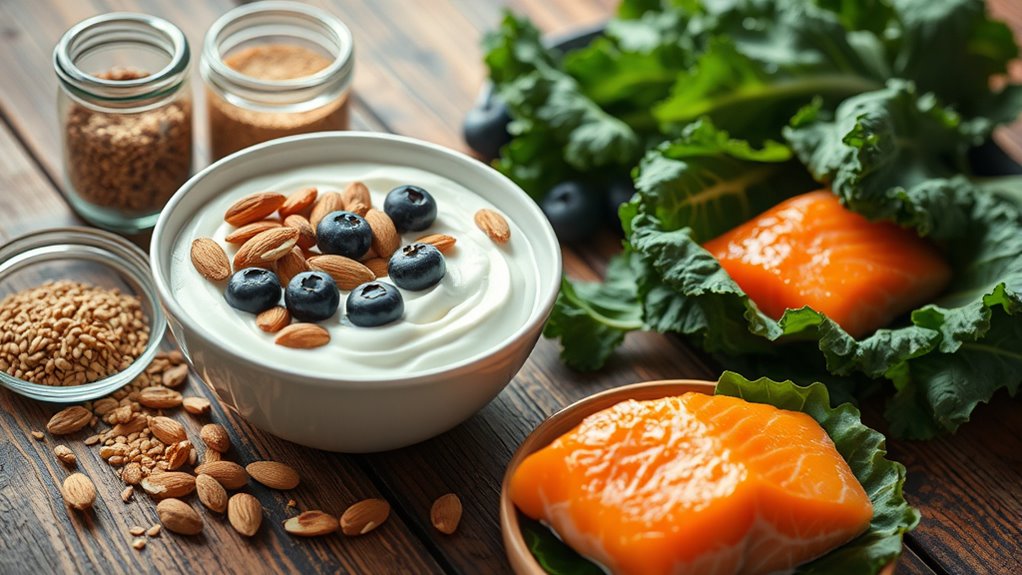
Supplementing your diet can play a vital role in maintaining bone health after 40, especially when getting enough nutrients from food alone becomes challenging. Calcium and vitamin D are key; calcium supports bone structure, while vitamin D helps your body absorb calcium effectively. Soy isoflavones can mimic estrogen, potentially reducing bone loss, especially in postmenopausal women. Magnesium and potassium assist in bone mineralization, though their impact isn’t as well-researched. Vitamin K activates proteins necessary for bone mineralization, and omega-3s may reduce inflammation, supporting overall bone health. Supplements like calcium combined with vitamin D can slow age-related bone loss. For best results, aim for long-term use, with soy isoflavones at 40-110 mg daily and vitamin D around 400-800 IU. Always consult your healthcare provider to tailor doses safely.
Frequently Asked Questions
How Does Age Affect Calcium Absorption in Women and Men?
You might notice that as you age, your body’s ability to absorb calcium decreases, roughly by 0.0021% each year. This decline affects both women and men equally, making it harder to maintain strong bones. Factors like lower vitamin D levels, lifestyle choices, and health conditions can worsen this. To stay healthy, you should focus on adequate calcium and vitamin D intake, especially as you get older.
Can Dietary Intake Alone Meet All My Bone Health Needs After 40?
They say, “You are what you eat,” but after 40, diet alone might not cut it. Your body’s ability to absorb nutrients declines, and hormonal changes speed up bone loss. While eating calcium-rich foods, vitamin D, and protein helps, you’ll likely need supplements and exercise to truly support your bone health. Relying solely on diet isn’t enough; a holistic approach is key for strong bones.
Are There Risks Associated With Taking High-Dose Vitamin D Supplements?
You’re asking if high-dose vitamin D supplements carry risks. Yes, they can. Taking too much may cause toxicity, leading to symptoms like nausea, muscle weakness, and kidney problems. Excessive levels can cause high calcium in your blood, resulting in discomfort and long-term health issues. To avoid these risks, always follow recommended doses and get regular blood tests. Consult a healthcare professional before starting high-dose supplements to guarantee safety.
How Do Lifestyle Choices Influence the Effectiveness of Nutrient Supplementation?
Your lifestyle choices directly impact how well nutrient supplementation works. When you stay active, especially with weight-bearing exercises, you enhance bone response to nutrients like calcium and vitamin D. Eating a balanced diet supports absorption and utilization of these nutrients. Avoiding smoking and excessive alcohol helps prevent bone loss. Consistency in exercise and diet amplifies supplement benefits, so making healthy habits part of your routine maximizes your bone health and overall well-being.
What Are the Signs of Nutrient Deficiencies Impacting Bone Health?
You might notice signs like bone pain, fractures, or muscle weakness, which often point to nutrient deficiencies affecting bone health. If you experience muscle cramps or irregular heartbeat, these could also signal calcium or vitamin D shortages. Sometimes, symptoms like fatigue or mood changes appear unexpectedly, emphasizing the importance of maintaining adequate nutrient intake. Recognizing these signs early helps you take action to support your bones effectively.
Conclusion
Think of your bones as a sturdy house built with strong bricks. To keep it standing tall after 40, you need the right tools—calcium, vitamin D, magnesium, and more. By nourishing your bones with these essential nutrients, you’re fundamentally reinforcing each brick and beam. With consistent care, your skeletal house remains resilient, standing proud and unshaken against the tests of time. Keep building your strength—your bones will thank you for it.
